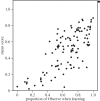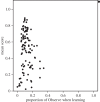Blackboxing: social learning strategies and cultural evolution
- PMID: 27069046
- PMCID: PMC4843607
- DOI: 10.1098/rstb.2015.0369
Blackboxing: social learning strategies and cultural evolution
Abstract
Social learning strategies (SLSs) enable humans, non-human animals, and artificial agents to make adaptive decisions aboutwhenthey should copy other agents, andwhothey should copy. Behavioural ecologists and economists have discovered an impressive range of SLSs, and explored their likely impact on behavioural efficiency and reproductive fitness while using the 'phenotypic gambit'; ignoring, or remaining deliberately agnostic about, the nature and origins of the cognitive processes that implement SLSs. Here I argue that this 'blackboxing' of SLSs is no longer a viable scientific strategy. It has contributed, through the 'social learning strategies tournament', to the premature conclusion that social learning is generally better than asocial learning, and to a deep puzzle about the relationship between SLSs and cultural evolution. The puzzle can be solved by recognizing that whereas most SLSs are 'planetary'--they depend on domain-general cognitive processes--some SLSs, found only in humans, are 'cook-like'--they depend on explicit, metacognitive rules, such ascopy digital natives. These metacognitive SLSs contribute to cultural evolution by fostering the development of processes that enhance the exclusivity, specificity, and accuracy of social learning.
Keywords: asocial learning; associative learning; blackboxing; cultural evolution; metacognition; social learning strategies.
© 2016 The Author(s).
Figures


References
-
- Grafen A. 1984. Natural selection, kin selection and group selection. In Behavioural ecology (eds Krebs JR, Davies NB), pp. 62–84. Oxford, UK: Blackwell Scientific Publications.
-
- Hoppitt W, Laland KN. 2013. Social learning: an introduction to mechanisms, methods, and models. Princeton, NJ: Princeton University Press.
Publication types
MeSH terms
LinkOut - more resources
Full Text Sources
Other Literature Sources
